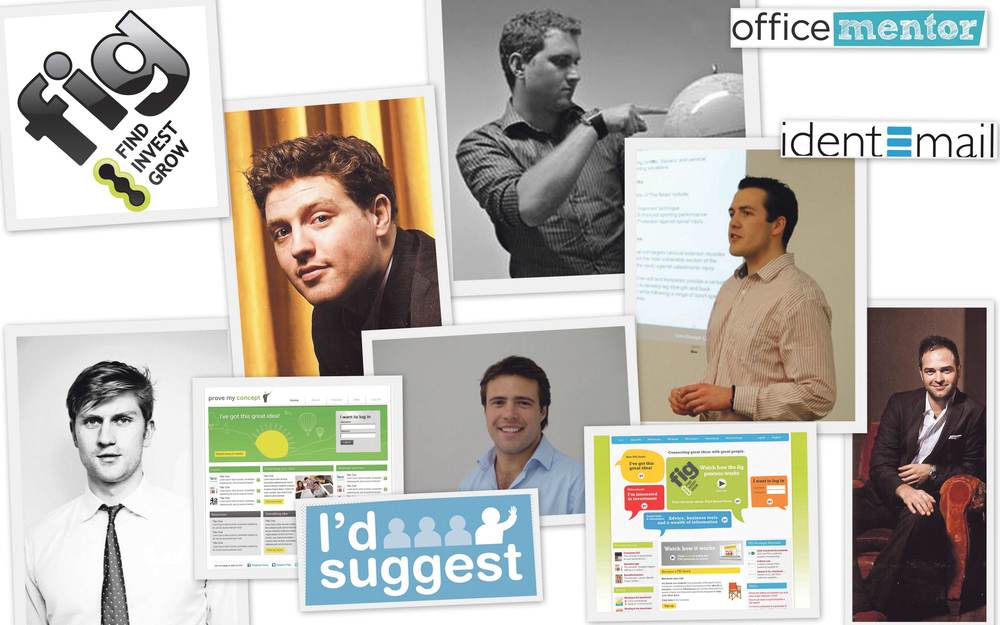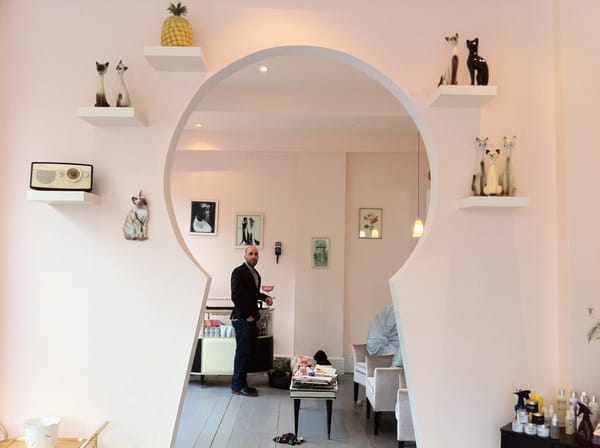FIG grows by finding eleven more businesses to invest in
The finale to Sina Ataherian’s two-part interview with James King, CEO of FIG

In 2009, James King founded Find Invest Grow (FIG). FIG is a young company that funds and supports promising enterprises started-up by university students, including from Imperial College. James currently serves as its CEO. The firm is involved with fifteen different student-led businesses, across a broad range of sectors: sports equipment, online retail, lingerie, and user-generated news.
In part one of the interview, James shared his thoughts on the broader economy, how it is affected by government policy, and how it affects his businesses. In part two, the focus is on FIG as a company, what it does, plans for the future, and James’s own thoughts on business.
Felix first interviewed you a year and a half a go. You had three companies but said that number would grow. Have things gone as well as you were expecting?
It certainly has. We are now up to fourteen companies, and recently got our fifteenth. The company that you featured last year (SpineStrength) is doing incredibly well. I thought it would take longer for people to trust us, because it is a big thing. It turns out people really like our business model. We do charge, but from the guys who have the money, the investors, not the guys looking to get money. If a student is looking to raise money, they are not in the best position to pay big fees.
What is so unique about university students that you focus exclusively on them?
The biggest reason is that they should be able to do their own research. You should at least be able to Google your idea. If you are not a university student and you can do that, we will still welcome you, but you will have to push harder to convince us that you can do it. That being said, there are a lot of university students who cannot do that. There are also other advantages to being a university student. They have the best resources. They are surrounded by connections. These are very difficult to get if you are not a university student, but it is not impossible.
Many students face a dilemma in deciding whether to start up their own businesses because it would mean missing out on graduate programmes. Do you have any thoughts on that?
I would say go for it. The worst that can happen is the business fails a few years down the line and you go to a graduate programme and start from scratch. It sucks, but on the upside, the business might not fail and you might never have to work again.
Last year you said you were quite keen to work with university entrepreneurship societies. Having becoming more established, has that ceased being a priority?
No, not at all. Next year we will be launching an accreditation scheme. The average turnover of a university society in the UK is three and a bit thousand pounds. The average turnover of an enterprise society is half that. We are going to set up standards to recognise enterprising societies in all areas, not just enterprise societies.
We will advertise to hundreds of universities, telling them that all of their societies may or may not qualify. They will have to submit applications saying how much they turned over and how they did it. The reason why they will have an incentive to do this is because we will give them £10,000. At the next level up, there will be £15,000 for societies that run a few events that show they are enterprising.
Then for the top tier, like the SIFE Society at Nottingham University, which turns over £70,000 per year, we will give them the Gold certificate. They will be in the running to win £25,000.
A lot of these enterprise societies are going around saying, "you join us and you are an entrepreneur." No, you’re not! That does not make any sense. We want them to get out and do enterprising things.
The Imperial Entrepreneurs Society provides networking opportunities and organises lectures and competitions. Do you think they necessarily need to run enterprises themselves to be able to call themselves enterprise societies?
Yes. Imperial Entrepreneurs’ Society is one of the better ones in the country but they are not perfect. They have a good reputation and several of their members have come to FIG with ideas. That is good, but FIG cannot support everybody. For our service to be better, the entrepreneurs’ societies need to be better.
They do a lot of networking, which is fine, but it is not everything. At Imperial, you should be able to have that already. There are so many academics here as well, who are easy enough to talk to. You do not need to be shoved into a room and told to meet people, and say, "here is my business card." You do not need that.
What someone might need is to hear real stories. The societies can get local businessmen in to talk. Keep things simple. The real entrepreneurs might not have two hours to sit and listen to a lecture, they might have half an hour. It would be great if they could just walk in for half an hour and get out thinking, "cool, we learned something new."
This is something we are building into the awards. To get a gold certificate, societies need to hold a certain number of events every year when their members can say, "this is my start up, this is what I am working on at the moment."
There are plenty of societies that just ring up accountants and ask if they can come in and give them a talk. They say yes, they turn up, and they are boring as hell.
There are some really great sets of accountants and lawyers knocking about London. There is Waterfront Solicitors, who are based near London Bridge. The lady who set that up has a great personal entrepreneurial story. But does anyone ever ask her to speak? No, because they pick up the phone and go to PwC.
We are going to insist that societies that apply for our accreditation scheme have at least one business set up by one of their members, because if you do not help to set up any businesses, what is the point? What is the point of being an enterprise society? We had over 3000 people come through our doors with ideas and we have eleven more companies than we did last year. So it is not difficult to get maybe three companies to form with good ideas, so we expect at least one.
Enterprise societies should be looking to find students with good ideas. They need to come to be brought to the society so they can meet other people with good ideas and be inspired. That is what we are trying to encourage, and why we are offering £55,000 in prizes.
Does running this accreditation scheme suggest that you are looking to expand beyond even your current size?
We just want more to choose from in terms of businesses. At the moment, we get plenty of people coming through and obtaining funding and we cannot charge them because we cannot get involved. The more people we get using our services, the more people we get coming through that we can chose from.
So are you planning to keep your focus on quality over quantity?
Absolutely. If we do expand, it will be on a director basis. Each director looks after five or six businesses. We do not want to have a hundred companies, but maybe thirty companies. We are already halfway there, which is shocking. If we need to get bigger, we will hire more directors. I cannot imagine ever hiring more than ten directors, because I like to be involved, even if I am not directly running the business.
In our interview last year, we focused on SpineStrength, a sports equipment business started by Doug Higgins when he played rugby for Imperial College. How is that doing?
SpineStrength is doing very well. It has gained interest from the NFL and several large sports clubs. Doug is currently working with researchers from Imperial College on developing his products. It is now a massively successful company. Doug is happy, taking a salary and building it up.
How much equity has he retained?
Doug has 45%, which is quite a lot, especially given how quickly his company has grown.
One of your other companies, GaBoom, was featured on Dragon’s Den but did not receive funding. What did you see that the dragon’s did not?
Jess may or may not have already had funding from us for GaBoom when she went on the Den, not that we would use it for free publicity or anything. They could have edited it either way, either to show what actually happened, or to make her look bad, which is what actually happened.
They edited the bit where Deborah Meaden was asking her to change the name to ‘Video Swapper’ because otherwise people would not know what GaBoom meant.
Jess asked about Ebay, Amazon, Yahoo, these famous names that have no relevance to what they do. Anyway, it could have gone either way. It took months to get on the show and in that time she had already raised funding. At the same time, if they made a good offer, she would have discussed it.
How will the fund that you are setting up in the summer to invest directly in FIG seeds affect your business?
It will just make it quicker. We see these companies that are great and only need a hundred grand. In the past there have been situations where myself and the partners have invested our own money, but there are only so many times we can do this.
Setting up this fund will mean being able to tell people that they can start in a week. They might need £300,000 but if we can give them £50,000 that is enough for them to get things moving. Like everything we do, we want this to be a service that we would use ourselves.
So is speed a major factor?
Speed and quality. It might sound clichéd but it is not. If you keep things simple, you can do things incredibly quickly, and yet keep a very high level of quality.
What stage do businesses need to be at before they come to you asking for funding?
We had one guy who came in and said what he had done, and literally showed us the back of an envelope. We supported him to build a very successful company.
Is he one of your fifteen companies?
Yes, he is very good lad. He came in and we discussed the idea. He did not spend long, maybe ten or fifteen minutes. I said he should put his idea online. It must have taken two or three weeks. Then he had a clear idea and by the end of it we had raised his money.
The obvious question, what advice do you have for students with an idea that they are thinking of turning into a business?
Go for it. Pursue your idea. What is the worst that could happen? Your business fails, and even then, if you are careful, you should avoid going bankrupt.
If you have an idea, analyse it. Do not plough ahead assuming the first idea is right. That is why our website is there. Another thing I would say is, do not think you have made it. Even when you have set up the business, you are still not an entrepreneur.
You are just a guy or a girl with an idea. Make sure you have good friends around you to ground you. If you say, "I am an entrepreneur", they should be able to say, "shut up. Be quiet."
When can someone say they are an entrepreneur?
When they have multiple successes. I like to think that an entrepreneur is a risk taker. Some people would also say that an entrepreneur needs to have an innovation.
That innovation can be small. It can just be charging a different price. It is funny how many people go around saying they are entrepreneurs.
Do you have a favourite business out of your FIG seeds?
My personal portfolio. Within that, I really could not say.
In that case, can you tell us whether the best companies in terms of success necessarily the ones you enjoy working with the most?
Yes, maybe not necessarily enjoy working with the most, but excited by the most. The most successful companies are the ones that are so exciting that you feel like you have to work on them.







